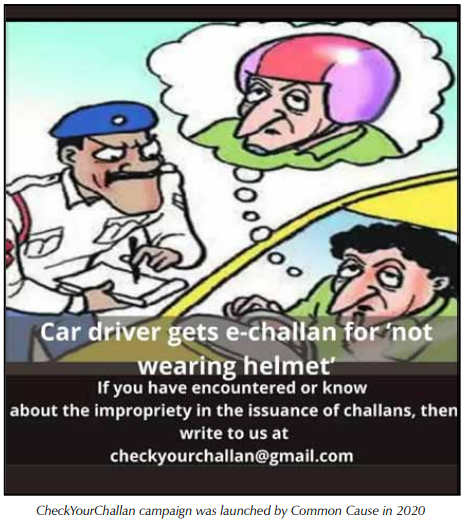Making a Difference Sans the Spotlight
Critical Cases Strengthening Life and Liberties
Anshi Beohar*
While writing for the Special Memorial issue of Common Cause, the former Governor of the erstwhile J&K State, Mr N N Vohra, wrote this about our founder Director: “Shourie Sahib will be remembered as the father of the consumer protection movement in the country and for his sustained battle to liquidate the nexus between secrecy and corruption in every sphere of governance.”

While the scope and scale of the Society’s activities remain vast, the legacy of its founder and subsequent directors continues to guide us in our future pursuits. For those adversely affected by a range of arbitrary govt decisions and violations of fundamental rights, some of our cases came as beacons of hope. For instance, the first pension case of 1980, filed in the Supreme Court, got India-wide attention and ended up benefitting 2.5 million pensioners. Common Cause’s Writ Petition received pro bono support from legal luminaries like Fali Nariman, P. H. Parikh and Anil Diwan, and was heard by a Constitution Bench of five judges.
While the scope and scale of the Society’s activities remain vast, the legacy of its founder and subsequent directors continues to guide us in our future pursuits
Other cases that made the organisation a household name focussed on issues ranging from illegal mining in Odisha, quashing of Section 66A of the IT Act, and right to die with dignity to cancellation (and re-auction) of the arbitrary 2G telecom licences.
But other crucially important cases did not make their way to the hall of fame, yet impacted millions of people in meaningful ways. This article is a curated compilation of the lesser-known interventions by Common Cause that have strengthened its objective for reforms, equal rights and the protection of transparency and integrity of the Indian democracy.
Against Exploitation at Workplace
In November 2021, the Labour and Employment Minister initiated the first-ever All-India Survey on Domestic Workers (covering 37 states and UTs and 742 districts). It aims to identify the number of households engaging domestic workers, wages paid and related demographics and the average number of workers engaged by various kinds of households. Other details sought to be revealed by the survey include the proportion of domestic workers at the national-level and in the states as well as ratio of live-in/ live-out workers, migrant/non-migrant workers, etc.1 This survey will also study the effect of the pandemic on various aspects of a domestic worker’s life.
Common Cause recognised the importance of the rights of domestic workers and filed a writ in the Supreme Court in 2018, to ensure fair and humane working conditions. The petition argued that interim guidelines should be issued for safeguarding the human rights and interest of domestic workers inside private homes of the employers. Among other things, they should have a maximum of an eight-hour workday, weekly rest, the right to paid leaves, maternity benefits, notice of termination and one month’s salary in lieu of notice of termination, in line with ILO Convention 189, until a law is brought in place.
The petition also prayed for a Committee of Experts to be appointed under the supervision of the Supreme Court to suggest means to regulate domestic workers’ employment agencies. The Committee should also regulate the terms and conditions of dignified employment of domestic workers as well as set up a mechanism for dispute resolution. The matter is pending in the Supreme Court.
The present case seeking to secure humane working conditions of domestic workers is in continuation of many other similar matters taken up by Common Cause in the past. In 2010, a petition was filed in Delhi High Court to highlight and ameliorate the unsafe working conditions at construction projects of the 18th Commonwealth Games 2010. A series of orders were issued to the Labour Department and other concerned authorities in order to ensure the health, safety and rights of these workers. The Court made recommendations on measures to streamline the administration of labour laws and the implementation of labour welfare schemes and directed that an ‘action-taken report’ be filed within six months.
HIV-AIDS Control Programmes
The latest India HIV Estimation 2020 report released by National AIDS Control Organisation (NACO) found that “the national adult prevalence continued to decline from an estimated peak level of 0.54% in 2000–2001 through 0.33% in 2010 to 0.22% in 2020. This corresponds to a 33.3% decline in the last ten years.”2
Despite the current decline, the scenario was pretty grim in the earlier years. In 2003, Common Cause filed a petition seeking to streamline the operations of NGOs in the HIV-AIDS Control Programme and to universalise the access to counselling and specialised HIV-AIDS treatment. The petition highlighted the spread of HIV-AIDS in India and also brought to light the corrupt practices followed by several NGOs working with NACO.
Common Cause urged the authorities to take urgent steps to weed out the suspect and bogus NGOs as well as to set up a proper mechanism for monitoring the work of non-profits working in this space. Additionally, we prayed for appropriate legislation to ensure that patients are not refused treatment but given access to medicines and diagnostic centres either free of cost or at subsidised rates. The Union of India, in response to the petition, formulated a scheme for universal access to second line treatment of HIV-AIDS.
Road Safety
Common Cause has also contributed to the efforts to ensure road safety and has made interventions

to prevent road accidents and casualties over the years. Multiple petitions were filed to bring into light the increase in road accidents in both the Supreme Court and Delhi High Court. They have led to an enduring impact on the security of citizens on Delhi roads.
In 1998, Common Cause petitioned for the phasing out of the privatelyowned Blueline buses.
These buses were introduced in Delhi in 1992 in the wake of a sudden strike by the Delhi Transport Corporation (DTC) staff protesting the non-implementation of the recommendations of fourth pay commission. In the absence of any direct control from the govt, the Blueline bus operators plied without fixed routes and competed against each other throughout their runs. The drivers flouted traffic rules while the operators acted arbitrarily. Yet punitive action against errant drivers was allegedly slow.
The Delhi High Court, while adjudicating another case, termed them “killers” and held them responsible for most of the accidental deaths. Eventually, the then Delhi Transport Minister Arvinder Singh Lovely set the deadline of December 14, 2010, to cease the functioning of Blueline buses and ensured that the network of DTC buses and Metro was in a position to replace the private fleet3.
The objective of ensuring road safety and secure journeys for citizens have been taken up by Common Cause in recent times as well. It launched a campaign to promote awareness about e-challans amongst drivers and vehicle owners, #CheckYourChallan in 2020. The campaign was aimed at generating awareness across social media platforms about the exact procedure of checking and pursuing e-challans. In response to the growing distress of common citizens regarding the new e-challan system and the e-payment gateway launched by Delhi Traffic Police, Common Cause had also sent representations to the Delhi Police Commissioner and the Union Minister, Ministry of Roadways, Transport & Highways in 2020. We suggested that the authorities carry out a campaign with the participation of citizens to promote driver awareness of the automated systems so that they are able to maintain better road safety standards.
Environmental Degradation
Slaughterhouse Pollution: The devastation wrecked by the current pandemic is unlike any experience in living memory. Many have debated on the origins of the virus. A WHO team sent to Wuhan in China said that the introduction (of the virus) as a zoonotic (a disease that is transmitted between species) spill-over was deemed a “possible-to-likely pathway.”4 Clearly zoonotic diseases are emerging as the biggest public health threats of our times.
Common Cause had realised the health risks from animals long ago and had filed a petition. It outlined the extent of environmental pollution and danger of epidemics caused by disposal of animal waste and slurry on the land or in sewer systems. A substantial part of this slurry is generated from roadside vends that slaughter goats, sheep and poultry with impunity, regardless of all rules and regulations framed by the state.
Despite the Bureau of Indian Standards providing “Guidelines for Handling, Storage and Transport of Slaughter House By-products,” Common Cause discovered that these instructions were not being followed. With no other system in place, the slurry from slaughter houses from acts of illegal slaughter was being drained into public sewers. This sludge ultimately made its way into rivers, ponds and sometimes seeped into the underground water table. Children too, were found to be employed in slaughter houses and roadside vends, in violation of the Child Labour (Prohibition and Regulation) Act, 1986.
The petition prayed for remedial measures against the rampant malpractices in slaughter houses, notably improper waste disposal, slaughter of diseased animals and employment of children in the trade.
A bench headed by Justice K G Balakrishnan expressed displeasure on the state of the slaughter houses and asked for their upgradation. He also called for strict checks over private abattoirs operating without license. After the battle running for years, a compendium of the Indian Standards governing the slaughtering of animals and management of slaughter houses was prepared along with all relevant material. This was done in consultation with all stake-holders.
The Court directed the Centre to print the compendium and circulate it to all the state governments and Union Territories for compliance within six weeks. The Court disposed of the case on February 17, 2017, with the observation that the petitioners were entitled to approach the concerned District Collector or judicial authorities in the event of non-compliance with the Indian Standards, and other rules and regulations.
Conclusion
While Common Cause is better known for its more renowned cases about countering corruption, injustices and arbitrary appointments in public institutions, the lesser publicised cases too have managed to make a difference in their own right, and without fuss. These range from common problems of citizens to protecting their life and liberties to strengthening democracy and integrity in governance.
Endnotes
- PIB (2021, November 22). Shri Bhupender Yadav flags off first ever All India Survey on Domestic Workers. Press Information Bureau. Retrieved on March 13, 2022 from https://bit.ly/3r7bRj3
- India HIV Estimates 2020 (2021). National AIDS Control Organisation & Indian Council of Medical Research – National Institute of Medical Statistics (ICMR-NIMS), Ministry of Health & Family Welfare, Government of India. Retrieved on March 16, 2022 from https://bit.ly/3NRAIRS
- Dwaipayan Ghosh (2010, October 26). All Bluelines to go off Delhi roads by Dec 14. The Economic Times. Retrieved on March 12, 2022 from https://bit.ly/3jsdmo5
- Taran Deol (2021, December 30). As COVID-19 pandemic enters 3rd year, what do we know about its origin? Down To Earth. Retrieved on March 16, 2022 from https://bit.ly/3r5bO7u
NEXT »



